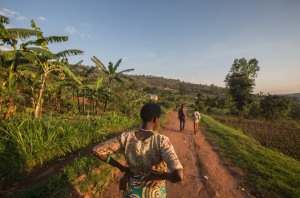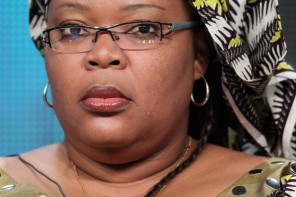This is, unhappily, the sequel to my earlier taken-down on major media coverage of rape in conflict. Turns out I have a little bit of a thing about this…
So the New York Times’ new West Africa guy is covering the violence in Guinea. (Missed it? Here’s the Twitter version: Government soldiers killed more than 150 political demonstrators last week; now reports are emerging that many women were raped.) It starts out fine — a lead about cell phone pictures that prove crimes the government is trying to deny, a quick recap of what happened, some diplo-info.
It’s all well and good until he talks to the rape victims. Here’s an excerpt of his interview:
“We heard gunfire,” she said. “I tried to flee.” With weapons going off, suddenly “it was like a henhouse.”
She ran, but a soldier barred the way.
“He hit me,” she said. “And he tore my clothes off. He ripped my clothes off with his hands.”
Then, she said, “he put his hand inside me.” The soldier hit her on the head with his rifle, requiring stitches, she said. She also had large welts from the beating.
A reporter I respect once pointed out to me that there’s a growing trend in African atrocity journalism — to use sparse, declarative language, preferably quotes, to retell the narrative of the atrocity. That sort of narrative stance and pacing can be powerful. It can also be foolish.
This strikes me as the latter case. Did he really have to include the quote about where the rapist put his hands? (I’m also not sure we need the literal frame-by-frame on this rape, but let’s concede it for the moment.) What purpose does it serve? Do I, as a reader who does not know Guinea or (presumably) rape, understand something better? I don’t think so. Does it create some kind of empathy or broader understanding for this woman? I don’t think so. In fact, she disappears from the story.
So what does it do? It “adds color,” sure. But to what end? My personal reaction is to feel kind of repulsed; I don’t feel empathy for this woman, I feel pity for her. Insert Representational Stereotype Number One: The Pitiful African.
The article continues to rehash several other women’s rapes in rather intimate detail, in some cases not by the women themselves but by men who witnessed the crimes.
Amanda Taub has been writing some pretty powerful stuff about the theft of voice and story in Darfur. This article raises similar questions for me: I know poor Adam needed some quotes, and he wrote early in the story that there’s stigma for women who admit surviving rape, and even doctors wouldn’t talk about the rape cases, so I sympathize with quoting, as he does later, a male doctor about what he witnessed.
Two things: One, do we need it? Do we need those quotes to understand what’s happening? There are times when the brutality of violence shouldn’t be hidden; I certainly was blunt and unforgiving in my descriptions of what happens when someone is tortured. But I don’t think this is one of those times.
Two, whether we need it or not, are we complicit? As readers of details that most women themselves wouldn’t share complicit in the theft (by a man, no less) of a story?
I’m not saying Adam, or any other worthy reporter, would quote someone without consent. I believe the women he quoted consented; but getting consent is only half of the question. The other half is how and why we think they’re consenting to talk to us, to give us the details they do; that’s a deal only the journalist knows and can make. And I’m not indicting Adam’s deal.
This may be too academic; this may be a case of me doing precisely what I remind others is so easy, armchair criticizing an article reported in chaos and difficulty. But that’s the best time for me to ask my questions, so that when I’m in Adam’s seat, I what I think I should be doing.





I think you make some excellent points – I agree that maybe not much is gained by adding in that type of detail or quote, and it can in fact contribute to distancing the reader from the subject.
That said, I also think that there are way worse examples of NYT reporters representing Africa poorly – Adam Nossiter has been doing a great job (in my non-expert opinion) covering recent events in Guinea, and all his articles on the topic have been well written.
I really appreciate that you picked up on these subtleties and wrote this insightful post, even though other examples could be more compelling.
Thanks, Penelope. Just to be clear, this isn’t supposed to be NYT-bashing, or comprehensive. It’s just one example of how easy it is to get caught up in the motions of reporting and writing a story, without realizing the implications of what seems most of the time so basic. I also happen to think there are examples of the NYT doing great work in Africa. This is more about how journalists in general write about atrocity, regardless of the outlet, and how the form and motions of deadline journalism can sometimes lead us in the wrong direction. (There’s some great work being done to advance a sensitivity about that at the Dart Center for Journalism and Trauma, if that’ of interest.)
At least he’s letting the victim tell her story in her own words. If she thought it was important to relate the gritty details of her attack, I don’t fault the reporter for reproducing her testimony.
You’re right, Lindsay. The own voice is important. But as for the gritty details of the attack — the issue for is, did he ask, or did she volunteer? And is it volunteering, or “volunteering?” What happens to me a lot is people say they’re willing to talk to me, but they’re trying to be polite, hospitable, etc. This happens even in these stories; there’s an acquiescence that seems like consent but may not be. And there’s no way for a reader to know which is which; it’s entirely the reporter’s call. I don’t know what Adam’s call was; I just think it’s important to think about the problem every once in awhile…
On the other hand, there are important questions about what and how much to tell the reader, and in what sequence, in order to do all the things a story should do: be informative; give context; be sensitive to the people who appear in it, etc. This story doesn’t work for me at the reader’s level.
I actually recall reading this article in the NYT and wincing at this particular passage. At the time I didn’t contemplate exactly why. As I think about it now, I recognize it was the detail of the scene that struck me as unexpected, and perhaps gratuitous. It may be that I felt drawn too far into the detail of that specific event (e.g. was it just his hand that he used?), which certainly distracts from the bigger picture of the article.
I don’t think many consumers of news media (whether print or otherwise) consider the details of the journalistic process on how and why things are written as they are, as well as how it influences us as readers. It is interesting to read your comments, and to think about the challenges involved in appropriately covering these type of topics.
I think your question, “Did he really have to include the quote…” is revealing.
What right does a reporter have to omit that quote? Or any others?
You seem to be confusing the role of a reporter. A reporter isn’t there to protect one party or another, no matter how horrific the circumstance. A reporter is there to document and tell a story. And in that process people will get hurt.
Which addresses your second question, are reporters complicit? Um, yes. Particularly, in Africa, where the power equation between reporter and source is often frightfully out of balance. Should this paralyze reporters from doing their jobs? I don’t think so.
But, I think any reporter covering violence–particularly sexual violence–needs to balance their obligation not to self-censor with whether they can live with the repercussions of reporting the story.
When a reporter begins engaging in other things, particularly divining what is best for their sources, they become something different, but certainly not a reporter.
I think Joan Didion put it well: “Writers are always selling somebody out.”
Thanks for your comments, Anon. But I wholeheartedly disagree. Reporters are omitting quotes all the time. They have to. No story, this story included, is a notebook dump — every since story you read in the newspaper or online represents an editorial choice, be it by reporters or editors or both, about what’s important for the story. No reporter would pretend otherwise. Part of the job — and the skill — in being a reporter is knowing what to choose, how, and why
Journalism, and and especially criticism of journalism, often acts as if reporters are stenographers, just people there to move a block of information from a room to a printed page. But we know that’s not the case. Put four reporters in a press conference, and you get four different stories. Similar, sure, but different. Put four reporters in a conflict zone, and you’ll get a bigger differential in “the” story. To expect anything different strikes me as naive.
You’re right that the power equation is way out of whack when reporting in Africa, and you’re right that that shouldn’t paralyze reporters from doing their jobs. It’s not the doing of the job that’s the issue; it’s how.
You’re also right that reporters aren’t social workers or protection advocates (in fact, I’m going to have a blog post up about this in just a day or two over at the Pulizter Center). But that doesn’t mean they can’t think sensitively about the impact of their editorial choices.
Here’s another thing Joan Didion does well: She chooses telling details. How many times have we as cub reporters seen phrases like “while sipping an iced tea” slashed from our copy? We think it’s color, but our editors teach us that it’s just extraneous detail. Details should add something, reveal something, give context or nuance.
What detail does the quote in question add? I know that the woman was raped by a man sticking his hand inside her. Does that add anything? Does that reveal any nuance, or make me understand the crime any better? I don’t think so. On the other hand, I think the cost is high — to the source, and to the reader (I’ve heard from quite a few people who didn’t finish the article).
I’m not saying everyone who thinks about these things will make the same choice as me. But I am saying it’s a choice, and we should acknowledge and take responsibility for it.